Organizational Behaviour Analysis and Recommendations for BBC
VerifiedAdded on 2020/11/12
|13
|4190
|335
Report
AI Summary
This report provides a comprehensive analysis of the organizational behaviour of the BBC, addressing key issues such as organizational culture, team dynamics, and employee motivation. The report begins by identifying organizational cultures using Handy's culture typology, examining the impact of culture, power, and politics on employee behaviour. It then explores strategies for improving team effectiveness through content and process theories of motivation, including techniques like performance-related pay, job rotation, and empowerment. The report further identifies different types of teams within an organization and uses the Tuckman and Jensen’s model of team development to enhance team effectiveness. Finally, it recommends organizational concepts and theories to improve BBC’s performance and productivity, while also identifying barriers to effective performance within the organization. The analysis provides actionable insights for fostering a more effective and productive work environment at BBC.
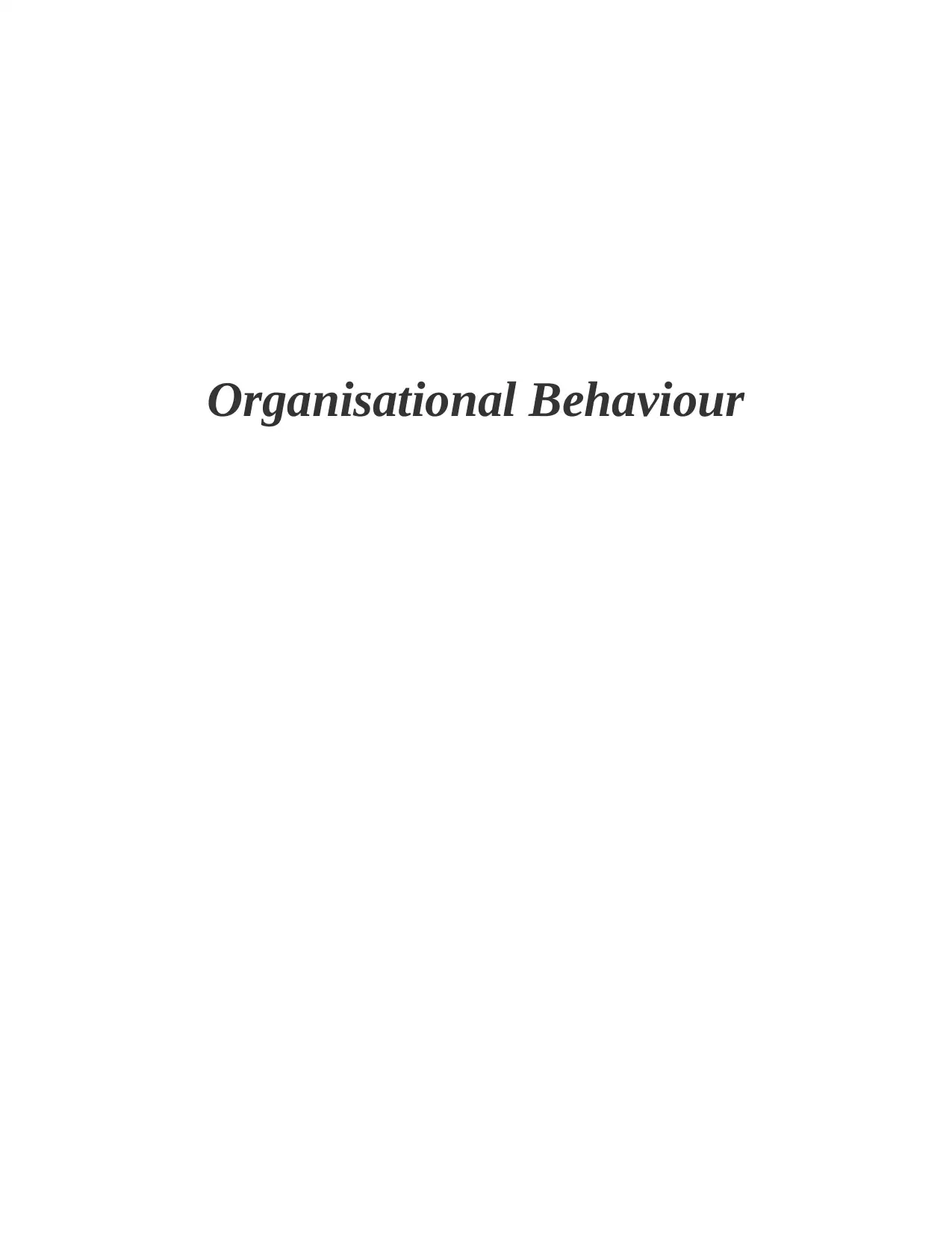
Organisational Behaviour
Paraphrase This Document
Need a fresh take? Get an instant paraphrase of this document with our AI Paraphraser
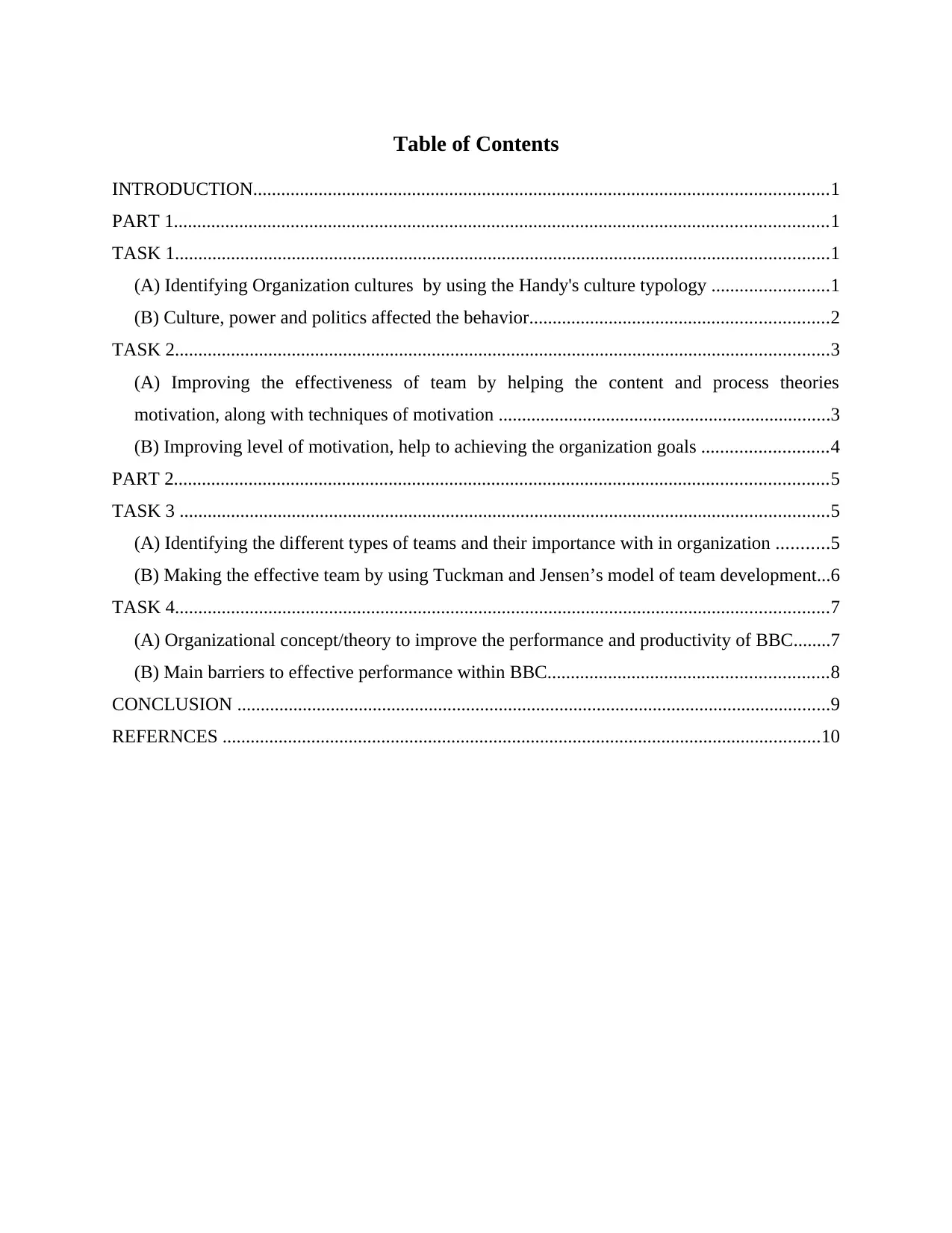
Table of Contents
INTRODUCTION...........................................................................................................................1
PART 1............................................................................................................................................1
TASK 1............................................................................................................................................1
(A) Identifying Organization cultures by using the Handy's culture typology .........................1
(B) Culture, power and politics affected the behavior................................................................2
TASK 2............................................................................................................................................3
(A) Improving the effectiveness of team by helping the content and process theories
motivation, along with techniques of motivation .......................................................................3
(B) Improving level of motivation, help to achieving the organization goals ...........................4
PART 2............................................................................................................................................5
TASK 3 ...........................................................................................................................................5
(A) Identifying the different types of teams and their importance with in organization ...........5
(B) Making the effective team by using Tuckman and Jensen’s model of team development...6
TASK 4............................................................................................................................................7
(A) Organizational concept/theory to improve the performance and productivity of BBC........7
(B) Main barriers to effective performance within BBC............................................................8
CONCLUSION ...............................................................................................................................9
REFERNCES ................................................................................................................................10
INTRODUCTION...........................................................................................................................1
PART 1............................................................................................................................................1
TASK 1............................................................................................................................................1
(A) Identifying Organization cultures by using the Handy's culture typology .........................1
(B) Culture, power and politics affected the behavior................................................................2
TASK 2............................................................................................................................................3
(A) Improving the effectiveness of team by helping the content and process theories
motivation, along with techniques of motivation .......................................................................3
(B) Improving level of motivation, help to achieving the organization goals ...........................4
PART 2............................................................................................................................................5
TASK 3 ...........................................................................................................................................5
(A) Identifying the different types of teams and their importance with in organization ...........5
(B) Making the effective team by using Tuckman and Jensen’s model of team development...6
TASK 4............................................................................................................................................7
(A) Organizational concept/theory to improve the performance and productivity of BBC........7
(B) Main barriers to effective performance within BBC............................................................8
CONCLUSION ...............................................................................................................................9
REFERNCES ................................................................................................................................10
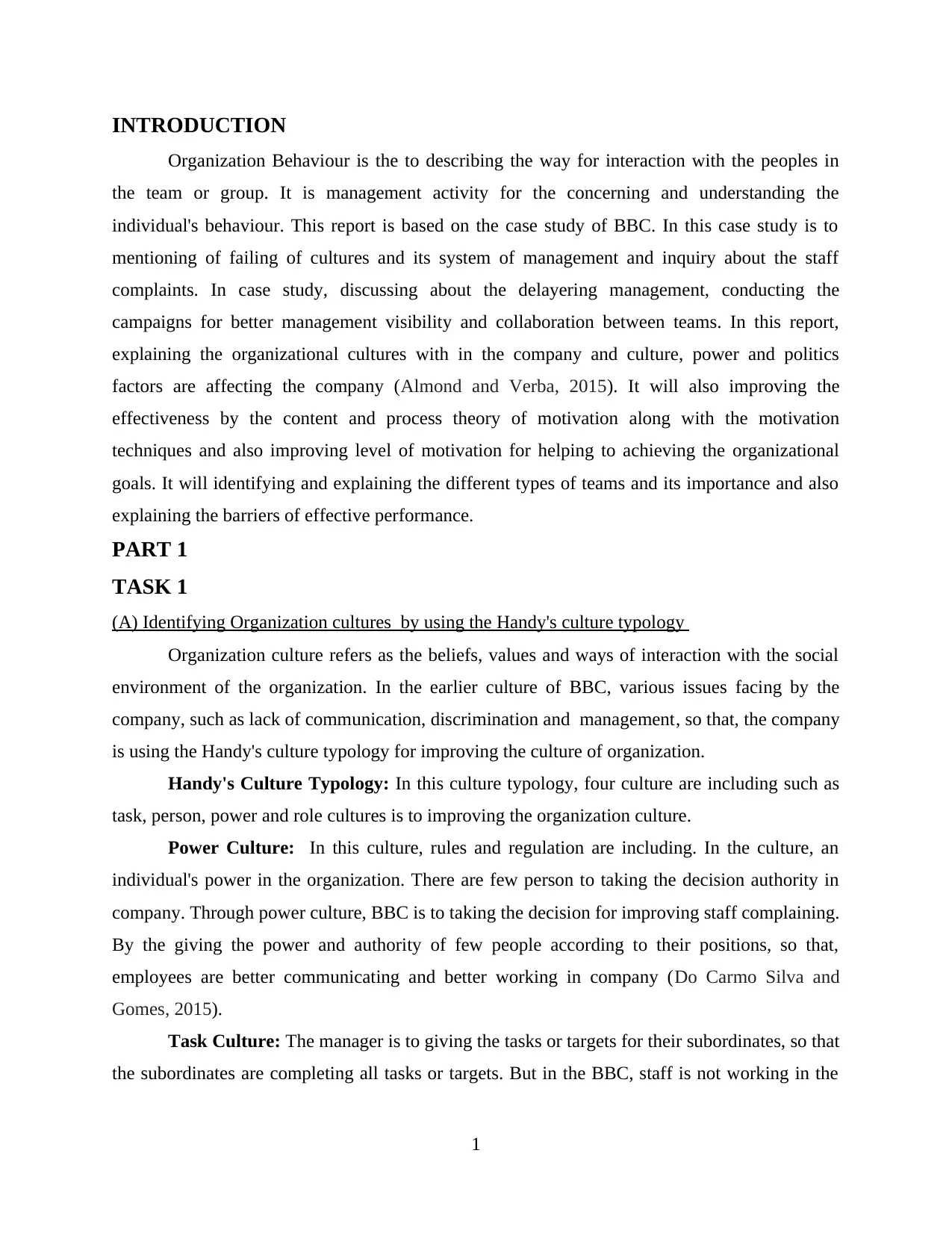
INTRODUCTION
Organization Behaviour is the to describing the way for interaction with the peoples in
the team or group. It is management activity for the concerning and understanding the
individual's behaviour. This report is based on the case study of BBC. In this case study is to
mentioning of failing of cultures and its system of management and inquiry about the staff
complaints. In case study, discussing about the delayering management, conducting the
campaigns for better management visibility and collaboration between teams. In this report,
explaining the organizational cultures with in the company and culture, power and politics
factors are affecting the company (Almond and Verba, 2015). It will also improving the
effectiveness by the content and process theory of motivation along with the motivation
techniques and also improving level of motivation for helping to achieving the organizational
goals. It will identifying and explaining the different types of teams and its importance and also
explaining the barriers of effective performance.
PART 1
TASK 1
(A) Identifying Organization cultures by using the Handy's culture typology
Organization culture refers as the beliefs, values and ways of interaction with the social
environment of the organization. In the earlier culture of BBC, various issues facing by the
company, such as lack of communication, discrimination and management, so that, the company
is using the Handy's culture typology for improving the culture of organization.
Handy's Culture Typology: In this culture typology, four culture are including such as
task, person, power and role cultures is to improving the organization culture.
Power Culture: In this culture, rules and regulation are including. In the culture, an
individual's power in the organization. There are few person to taking the decision authority in
company. Through power culture, BBC is to taking the decision for improving staff complaining.
By the giving the power and authority of few people according to their positions, so that,
employees are better communicating and better working in company (Do Carmo Silva and
Gomes, 2015).
Task Culture: The manager is to giving the tasks or targets for their subordinates, so that
the subordinates are completing all tasks or targets. But in the BBC, staff is not working in the
1
Organization Behaviour is the to describing the way for interaction with the peoples in
the team or group. It is management activity for the concerning and understanding the
individual's behaviour. This report is based on the case study of BBC. In this case study is to
mentioning of failing of cultures and its system of management and inquiry about the staff
complaints. In case study, discussing about the delayering management, conducting the
campaigns for better management visibility and collaboration between teams. In this report,
explaining the organizational cultures with in the company and culture, power and politics
factors are affecting the company (Almond and Verba, 2015). It will also improving the
effectiveness by the content and process theory of motivation along with the motivation
techniques and also improving level of motivation for helping to achieving the organizational
goals. It will identifying and explaining the different types of teams and its importance and also
explaining the barriers of effective performance.
PART 1
TASK 1
(A) Identifying Organization cultures by using the Handy's culture typology
Organization culture refers as the beliefs, values and ways of interaction with the social
environment of the organization. In the earlier culture of BBC, various issues facing by the
company, such as lack of communication, discrimination and management, so that, the company
is using the Handy's culture typology for improving the culture of organization.
Handy's Culture Typology: In this culture typology, four culture are including such as
task, person, power and role cultures is to improving the organization culture.
Power Culture: In this culture, rules and regulation are including. In the culture, an
individual's power in the organization. There are few person to taking the decision authority in
company. Through power culture, BBC is to taking the decision for improving staff complaining.
By the giving the power and authority of few people according to their positions, so that,
employees are better communicating and better working in company (Do Carmo Silva and
Gomes, 2015).
Task Culture: The manager is to giving the tasks or targets for their subordinates, so that
the subordinates are completing all tasks or targets. But in the BBC, staff is not working in the
1
⊘ This is a preview!⊘
Do you want full access?
Subscribe today to unlock all pages.

Trusted by 1+ million students worldwide
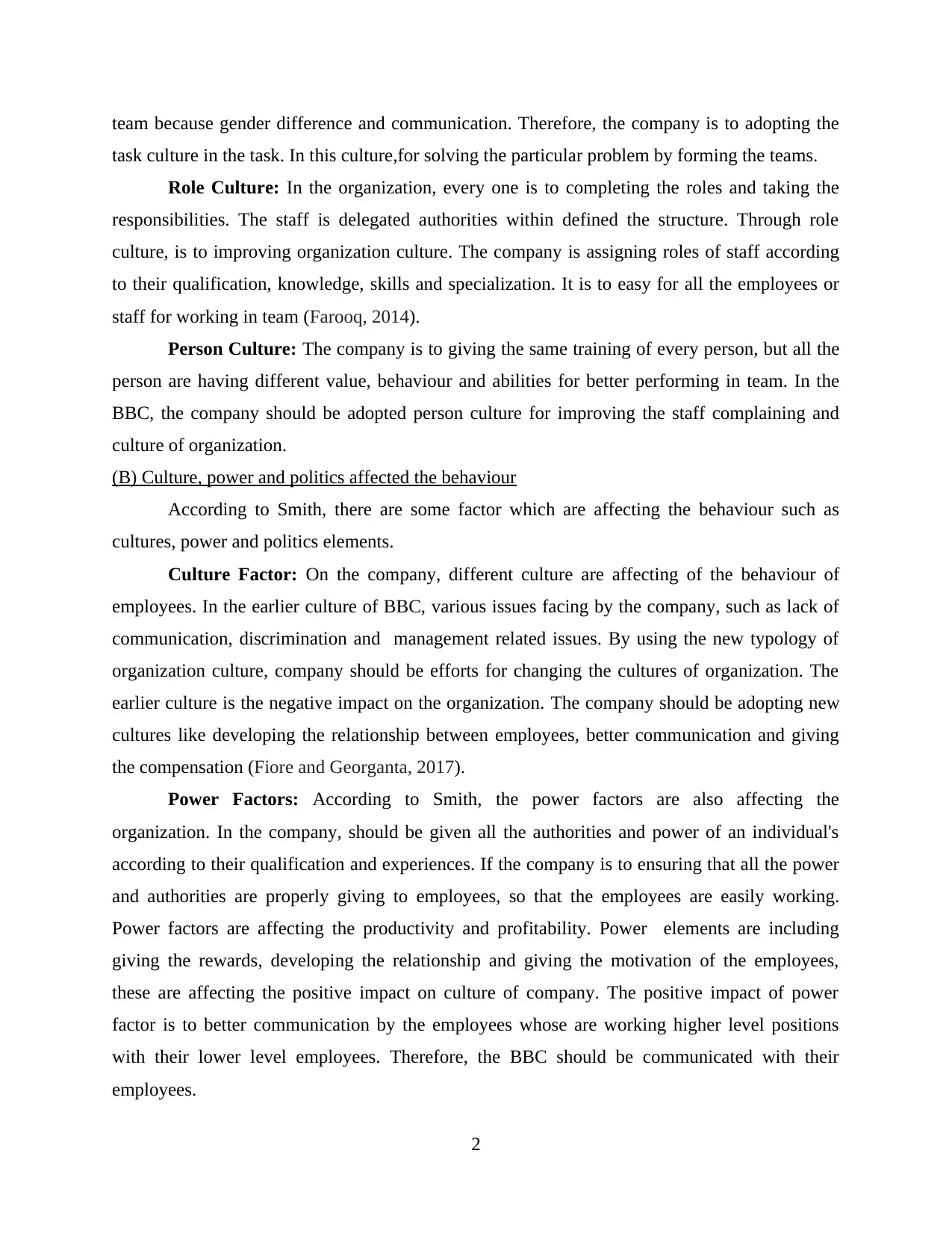
team because gender difference and communication. Therefore, the company is to adopting the
task culture in the task. In this culture,for solving the particular problem by forming the teams.
Role Culture: In the organization, every one is to completing the roles and taking the
responsibilities. The staff is delegated authorities within defined the structure. Through role
culture, is to improving organization culture. The company is assigning roles of staff according
to their qualification, knowledge, skills and specialization. It is to easy for all the employees or
staff for working in team (Farooq, 2014).
Person Culture: The company is to giving the same training of every person, but all the
person are having different value, behaviour and abilities for better performing in team. In the
BBC, the company should be adopted person culture for improving the staff complaining and
culture of organization.
(B) Culture, power and politics affected the behaviour
According to Smith, there are some factor which are affecting the behaviour such as
cultures, power and politics elements.
Culture Factor: On the company, different culture are affecting of the behaviour of
employees. In the earlier culture of BBC, various issues facing by the company, such as lack of
communication, discrimination and management related issues. By using the new typology of
organization culture, company should be efforts for changing the cultures of organization. The
earlier culture is the negative impact on the organization. The company should be adopting new
cultures like developing the relationship between employees, better communication and giving
the compensation (Fiore and Georganta, 2017).
Power Factors: According to Smith, the power factors are also affecting the
organization. In the company, should be given all the authorities and power of an individual's
according to their qualification and experiences. If the company is to ensuring that all the power
and authorities are properly giving to employees, so that the employees are easily working.
Power factors are affecting the productivity and profitability. Power elements are including
giving the rewards, developing the relationship and giving the motivation of the employees,
these are affecting the positive impact on culture of company. The positive impact of power
factor is to better communication by the employees whose are working higher level positions
with their lower level employees. Therefore, the BBC should be communicated with their
employees.
2
task culture in the task. In this culture,for solving the particular problem by forming the teams.
Role Culture: In the organization, every one is to completing the roles and taking the
responsibilities. The staff is delegated authorities within defined the structure. Through role
culture, is to improving organization culture. The company is assigning roles of staff according
to their qualification, knowledge, skills and specialization. It is to easy for all the employees or
staff for working in team (Farooq, 2014).
Person Culture: The company is to giving the same training of every person, but all the
person are having different value, behaviour and abilities for better performing in team. In the
BBC, the company should be adopted person culture for improving the staff complaining and
culture of organization.
(B) Culture, power and politics affected the behaviour
According to Smith, there are some factor which are affecting the behaviour such as
cultures, power and politics elements.
Culture Factor: On the company, different culture are affecting of the behaviour of
employees. In the earlier culture of BBC, various issues facing by the company, such as lack of
communication, discrimination and management related issues. By using the new typology of
organization culture, company should be efforts for changing the cultures of organization. The
earlier culture is the negative impact on the organization. The company should be adopting new
cultures like developing the relationship between employees, better communication and giving
the compensation (Fiore and Georganta, 2017).
Power Factors: According to Smith, the power factors are also affecting the
organization. In the company, should be given all the authorities and power of an individual's
according to their qualification and experiences. If the company is to ensuring that all the power
and authorities are properly giving to employees, so that the employees are easily working.
Power factors are affecting the productivity and profitability. Power elements are including
giving the rewards, developing the relationship and giving the motivation of the employees,
these are affecting the positive impact on culture of company. The positive impact of power
factor is to better communication by the employees whose are working higher level positions
with their lower level employees. Therefore, the BBC should be communicated with their
employees.
2
Paraphrase This Document
Need a fresh take? Get an instant paraphrase of this document with our AI Paraphraser
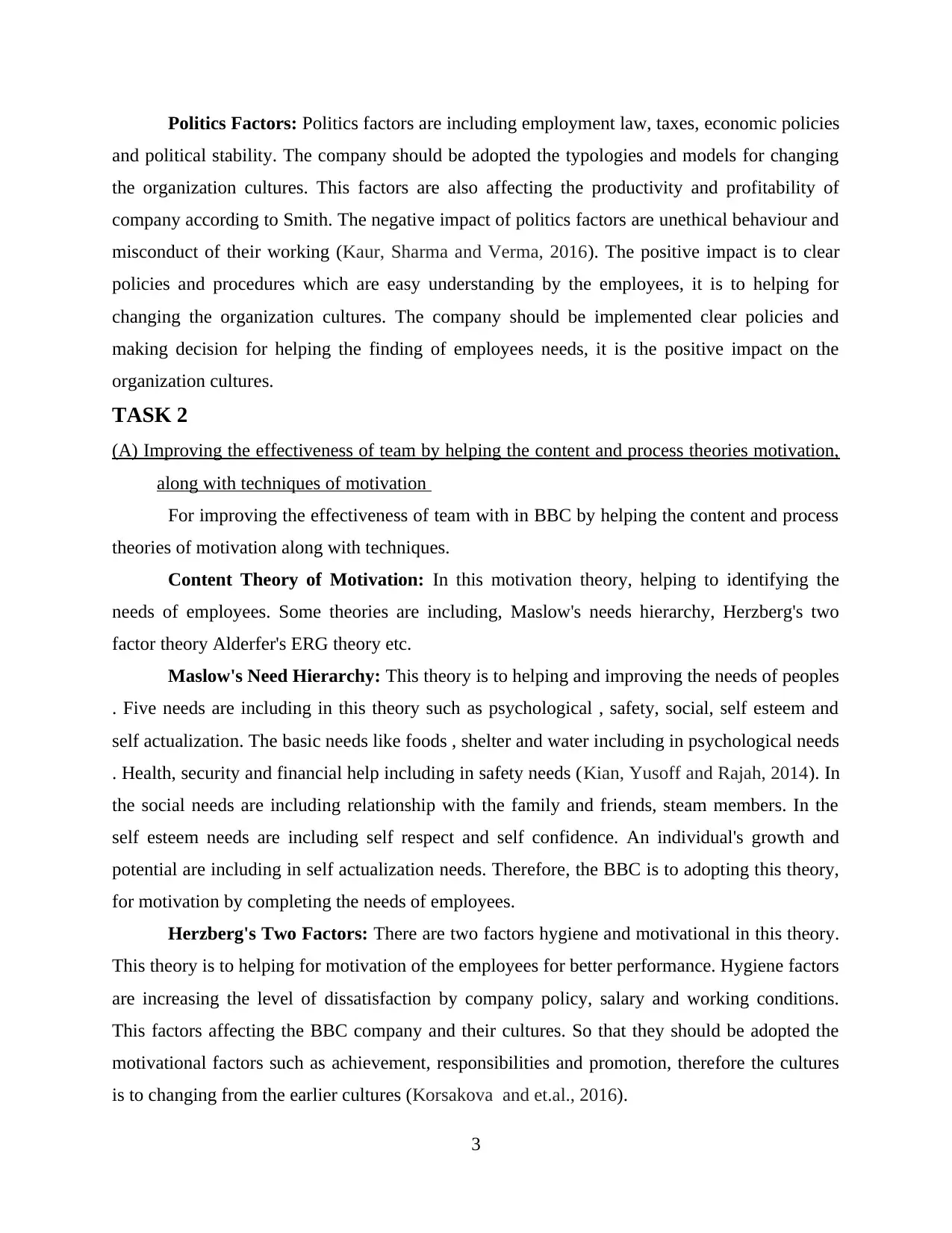
Politics Factors: Politics factors are including employment law, taxes, economic policies
and political stability. The company should be adopted the typologies and models for changing
the organization cultures. This factors are also affecting the productivity and profitability of
company according to Smith. The negative impact of politics factors are unethical behaviour and
misconduct of their working (Kaur, Sharma and Verma, 2016). The positive impact is to clear
policies and procedures which are easy understanding by the employees, it is to helping for
changing the organization cultures. The company should be implemented clear policies and
making decision for helping the finding of employees needs, it is the positive impact on the
organization cultures.
TASK 2
(A) Improving the effectiveness of team by helping the content and process theories motivation,
along with techniques of motivation
For improving the effectiveness of team with in BBC by helping the content and process
theories of motivation along with techniques.
Content Theory of Motivation: In this motivation theory, helping to identifying the
needs of employees. Some theories are including, Maslow's needs hierarchy, Herzberg's two
factor theory Alderfer's ERG theory etc.
Maslow's Need Hierarchy: This theory is to helping and improving the needs of peoples
. Five needs are including in this theory such as psychological , safety, social, self esteem and
self actualization. The basic needs like foods , shelter and water including in psychological needs
. Health, security and financial help including in safety needs (Kian, Yusoff and Rajah, 2014). In
the social needs are including relationship with the family and friends, steam members. In the
self esteem needs are including self respect and self confidence. An individual's growth and
potential are including in self actualization needs. Therefore, the BBC is to adopting this theory,
for motivation by completing the needs of employees.
Herzberg's Two Factors: There are two factors hygiene and motivational in this theory.
This theory is to helping for motivation of the employees for better performance. Hygiene factors
are increasing the level of dissatisfaction by company policy, salary and working conditions.
This factors affecting the BBC company and their cultures. So that they should be adopted the
motivational factors such as achievement, responsibilities and promotion, therefore the cultures
is to changing from the earlier cultures (Korsakova and et.al., 2016).
3
and political stability. The company should be adopted the typologies and models for changing
the organization cultures. This factors are also affecting the productivity and profitability of
company according to Smith. The negative impact of politics factors are unethical behaviour and
misconduct of their working (Kaur, Sharma and Verma, 2016). The positive impact is to clear
policies and procedures which are easy understanding by the employees, it is to helping for
changing the organization cultures. The company should be implemented clear policies and
making decision for helping the finding of employees needs, it is the positive impact on the
organization cultures.
TASK 2
(A) Improving the effectiveness of team by helping the content and process theories motivation,
along with techniques of motivation
For improving the effectiveness of team with in BBC by helping the content and process
theories of motivation along with techniques.
Content Theory of Motivation: In this motivation theory, helping to identifying the
needs of employees. Some theories are including, Maslow's needs hierarchy, Herzberg's two
factor theory Alderfer's ERG theory etc.
Maslow's Need Hierarchy: This theory is to helping and improving the needs of peoples
. Five needs are including in this theory such as psychological , safety, social, self esteem and
self actualization. The basic needs like foods , shelter and water including in psychological needs
. Health, security and financial help including in safety needs (Kian, Yusoff and Rajah, 2014). In
the social needs are including relationship with the family and friends, steam members. In the
self esteem needs are including self respect and self confidence. An individual's growth and
potential are including in self actualization needs. Therefore, the BBC is to adopting this theory,
for motivation by completing the needs of employees.
Herzberg's Two Factors: There are two factors hygiene and motivational in this theory.
This theory is to helping for motivation of the employees for better performance. Hygiene factors
are increasing the level of dissatisfaction by company policy, salary and working conditions.
This factors affecting the BBC company and their cultures. So that they should be adopted the
motivational factors such as achievement, responsibilities and promotion, therefore the cultures
is to changing from the earlier cultures (Korsakova and et.al., 2016).
3
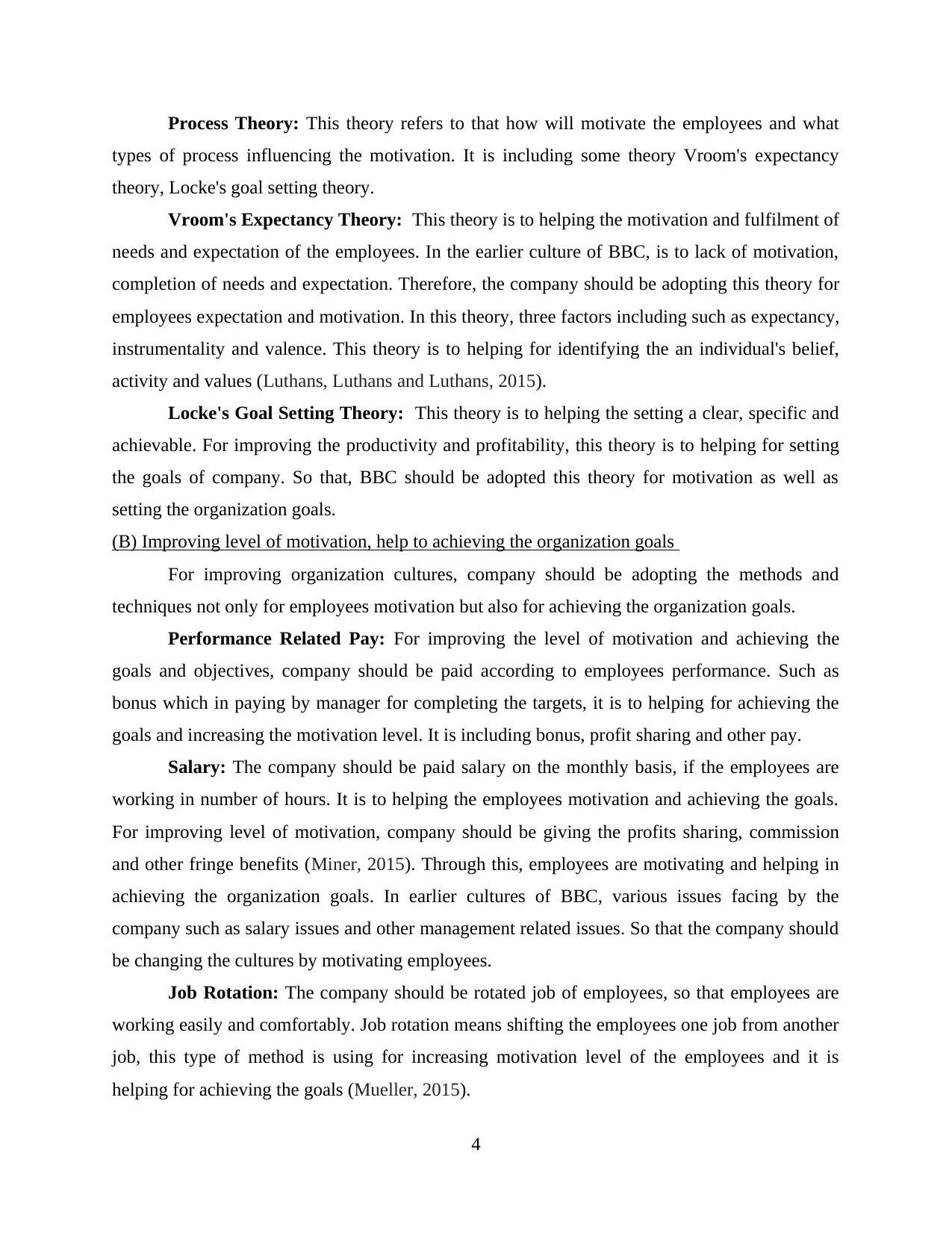
Process Theory: This theory refers to that how will motivate the employees and what
types of process influencing the motivation. It is including some theory Vroom's expectancy
theory, Locke's goal setting theory.
Vroom's Expectancy Theory: This theory is to helping the motivation and fulfilment of
needs and expectation of the employees. In the earlier culture of BBC, is to lack of motivation,
completion of needs and expectation. Therefore, the company should be adopting this theory for
employees expectation and motivation. In this theory, three factors including such as expectancy,
instrumentality and valence. This theory is to helping for identifying the an individual's belief,
activity and values (Luthans, Luthans and Luthans, 2015).
Locke's Goal Setting Theory: This theory is to helping the setting a clear, specific and
achievable. For improving the productivity and profitability, this theory is to helping for setting
the goals of company. So that, BBC should be adopted this theory for motivation as well as
setting the organization goals.
(B) Improving level of motivation, help to achieving the organization goals
For improving organization cultures, company should be adopting the methods and
techniques not only for employees motivation but also for achieving the organization goals.
Performance Related Pay: For improving the level of motivation and achieving the
goals and objectives, company should be paid according to employees performance. Such as
bonus which in paying by manager for completing the targets, it is to helping for achieving the
goals and increasing the motivation level. It is including bonus, profit sharing and other pay.
Salary: The company should be paid salary on the monthly basis, if the employees are
working in number of hours. It is to helping the employees motivation and achieving the goals.
For improving level of motivation, company should be giving the profits sharing, commission
and other fringe benefits (Miner, 2015). Through this, employees are motivating and helping in
achieving the organization goals. In earlier cultures of BBC, various issues facing by the
company such as salary issues and other management related issues. So that the company should
be changing the cultures by motivating employees.
Job Rotation: The company should be rotated job of employees, so that employees are
working easily and comfortably. Job rotation means shifting the employees one job from another
job, this type of method is using for increasing motivation level of the employees and it is
helping for achieving the goals (Mueller, 2015).
4
types of process influencing the motivation. It is including some theory Vroom's expectancy
theory, Locke's goal setting theory.
Vroom's Expectancy Theory: This theory is to helping the motivation and fulfilment of
needs and expectation of the employees. In the earlier culture of BBC, is to lack of motivation,
completion of needs and expectation. Therefore, the company should be adopting this theory for
employees expectation and motivation. In this theory, three factors including such as expectancy,
instrumentality and valence. This theory is to helping for identifying the an individual's belief,
activity and values (Luthans, Luthans and Luthans, 2015).
Locke's Goal Setting Theory: This theory is to helping the setting a clear, specific and
achievable. For improving the productivity and profitability, this theory is to helping for setting
the goals of company. So that, BBC should be adopted this theory for motivation as well as
setting the organization goals.
(B) Improving level of motivation, help to achieving the organization goals
For improving organization cultures, company should be adopting the methods and
techniques not only for employees motivation but also for achieving the organization goals.
Performance Related Pay: For improving the level of motivation and achieving the
goals and objectives, company should be paid according to employees performance. Such as
bonus which in paying by manager for completing the targets, it is to helping for achieving the
goals and increasing the motivation level. It is including bonus, profit sharing and other pay.
Salary: The company should be paid salary on the monthly basis, if the employees are
working in number of hours. It is to helping the employees motivation and achieving the goals.
For improving level of motivation, company should be giving the profits sharing, commission
and other fringe benefits (Miner, 2015). Through this, employees are motivating and helping in
achieving the organization goals. In earlier cultures of BBC, various issues facing by the
company such as salary issues and other management related issues. So that the company should
be changing the cultures by motivating employees.
Job Rotation: The company should be rotated job of employees, so that employees are
working easily and comfortably. Job rotation means shifting the employees one job from another
job, this type of method is using for increasing motivation level of the employees and it is
helping for achieving the goals (Mueller, 2015).
4
⊘ This is a preview!⊘
Do you want full access?
Subscribe today to unlock all pages.

Trusted by 1+ million students worldwide
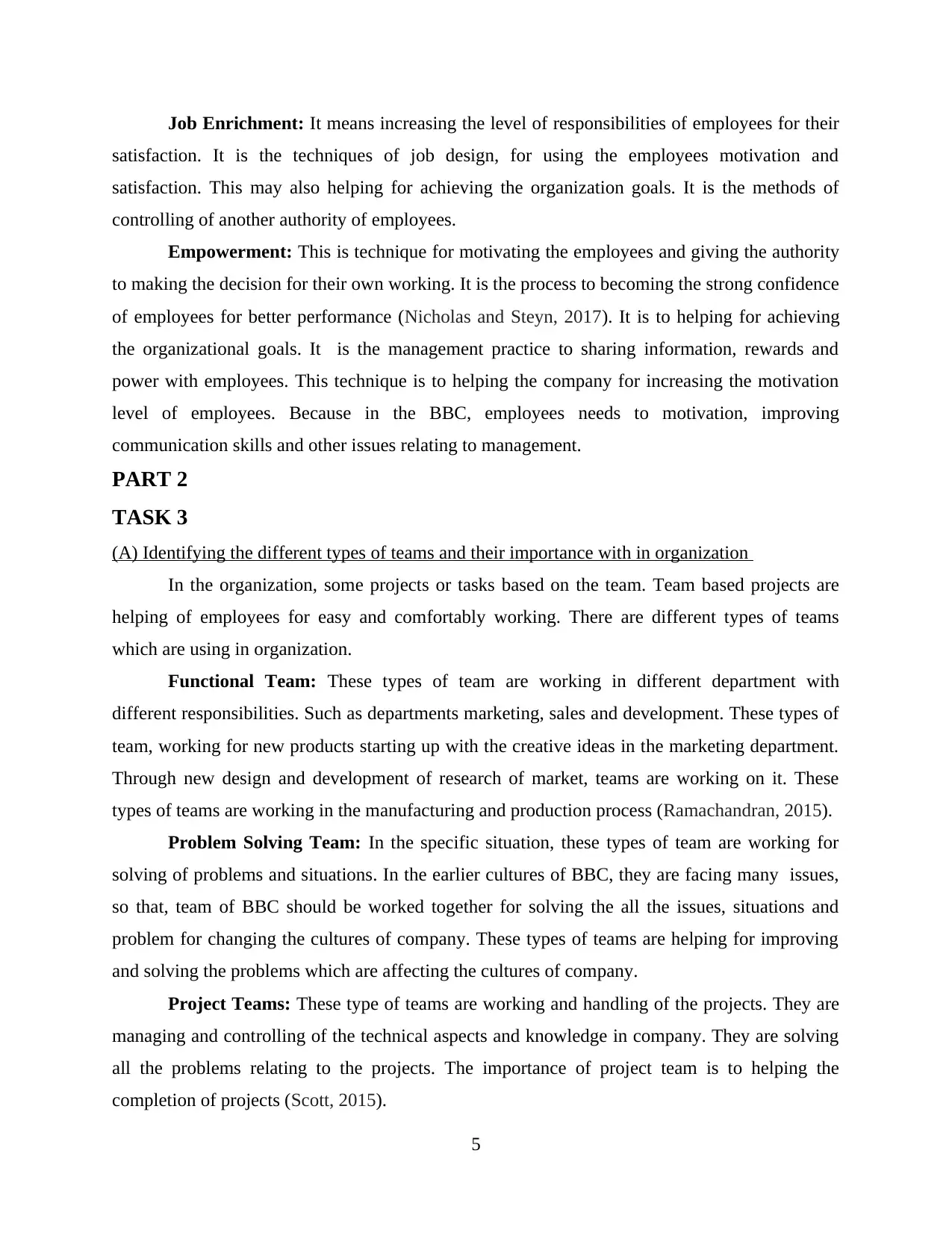
Job Enrichment: It means increasing the level of responsibilities of employees for their
satisfaction. It is the techniques of job design, for using the employees motivation and
satisfaction. This may also helping for achieving the organization goals. It is the methods of
controlling of another authority of employees.
Empowerment: This is technique for motivating the employees and giving the authority
to making the decision for their own working. It is the process to becoming the strong confidence
of employees for better performance (Nicholas and Steyn, 2017). It is to helping for achieving
the organizational goals. It is the management practice to sharing information, rewards and
power with employees. This technique is to helping the company for increasing the motivation
level of employees. Because in the BBC, employees needs to motivation, improving
communication skills and other issues relating to management.
PART 2
TASK 3
(A) Identifying the different types of teams and their importance with in organization
In the organization, some projects or tasks based on the team. Team based projects are
helping of employees for easy and comfortably working. There are different types of teams
which are using in organization.
Functional Team: These types of team are working in different department with
different responsibilities. Such as departments marketing, sales and development. These types of
team, working for new products starting up with the creative ideas in the marketing department.
Through new design and development of research of market, teams are working on it. These
types of teams are working in the manufacturing and production process (Ramachandran, 2015).
Problem Solving Team: In the specific situation, these types of team are working for
solving of problems and situations. In the earlier cultures of BBC, they are facing many issues,
so that, team of BBC should be worked together for solving the all the issues, situations and
problem for changing the cultures of company. These types of teams are helping for improving
and solving the problems which are affecting the cultures of company.
Project Teams: These type of teams are working and handling of the projects. They are
managing and controlling of the technical aspects and knowledge in company. They are solving
all the problems relating to the projects. The importance of project team is to helping the
completion of projects (Scott, 2015).
5
satisfaction. It is the techniques of job design, for using the employees motivation and
satisfaction. This may also helping for achieving the organization goals. It is the methods of
controlling of another authority of employees.
Empowerment: This is technique for motivating the employees and giving the authority
to making the decision for their own working. It is the process to becoming the strong confidence
of employees for better performance (Nicholas and Steyn, 2017). It is to helping for achieving
the organizational goals. It is the management practice to sharing information, rewards and
power with employees. This technique is to helping the company for increasing the motivation
level of employees. Because in the BBC, employees needs to motivation, improving
communication skills and other issues relating to management.
PART 2
TASK 3
(A) Identifying the different types of teams and their importance with in organization
In the organization, some projects or tasks based on the team. Team based projects are
helping of employees for easy and comfortably working. There are different types of teams
which are using in organization.
Functional Team: These types of team are working in different department with
different responsibilities. Such as departments marketing, sales and development. These types of
team, working for new products starting up with the creative ideas in the marketing department.
Through new design and development of research of market, teams are working on it. These
types of teams are working in the manufacturing and production process (Ramachandran, 2015).
Problem Solving Team: In the specific situation, these types of team are working for
solving of problems and situations. In the earlier cultures of BBC, they are facing many issues,
so that, team of BBC should be worked together for solving the all the issues, situations and
problem for changing the cultures of company. These types of teams are helping for improving
and solving the problems which are affecting the cultures of company.
Project Teams: These type of teams are working and handling of the projects. They are
managing and controlling of the technical aspects and knowledge in company. They are solving
all the problems relating to the projects. The importance of project team is to helping the
completion of projects (Scott, 2015).
5
Paraphrase This Document
Need a fresh take? Get an instant paraphrase of this document with our AI Paraphraser
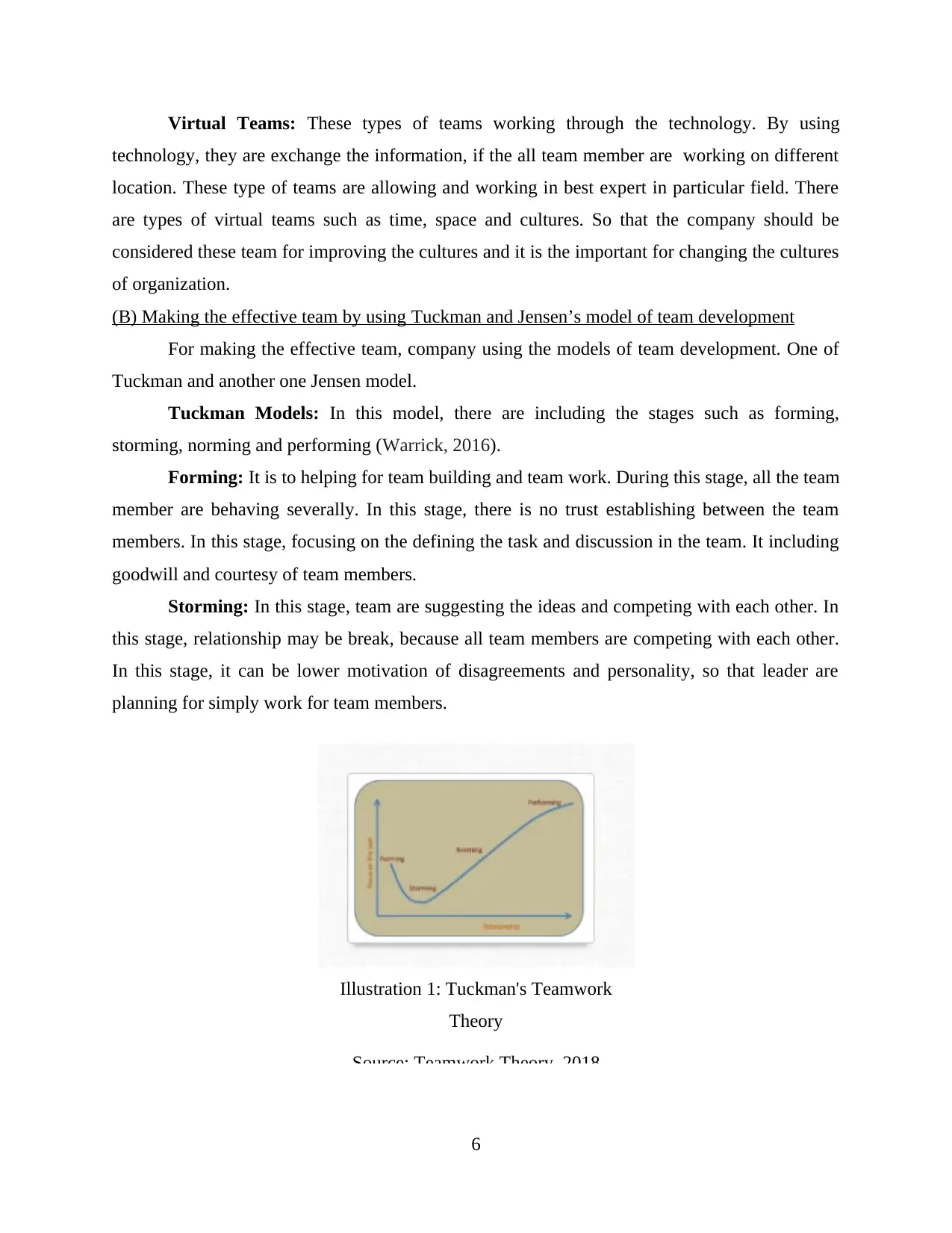
Virtual Teams: These types of teams working through the technology. By using
technology, they are exchange the information, if the all team member are working on different
location. These type of teams are allowing and working in best expert in particular field. There
are types of virtual teams such as time, space and cultures. So that the company should be
considered these team for improving the cultures and it is the important for changing the cultures
of organization.
(B) Making the effective team by using Tuckman and Jensen’s model of team development
For making the effective team, company using the models of team development. One of
Tuckman and another one Jensen model.
Tuckman Models: In this model, there are including the stages such as forming,
storming, norming and performing (Warrick, 2016).
Forming: It is to helping for team building and team work. During this stage, all the team
member are behaving severally. In this stage, there is no trust establishing between the team
members. In this stage, focusing on the defining the task and discussion in the team. It including
goodwill and courtesy of team members.
Storming: In this stage, team are suggesting the ideas and competing with each other. In
this stage, relationship may be break, because all team members are competing with each other.
In this stage, it can be lower motivation of disagreements and personality, so that leader are
planning for simply work for team members.
6
Illustration 1: Tuckman's Teamwork
Theory
Source: Teamwork Theory, 2018
technology, they are exchange the information, if the all team member are working on different
location. These type of teams are allowing and working in best expert in particular field. There
are types of virtual teams such as time, space and cultures. So that the company should be
considered these team for improving the cultures and it is the important for changing the cultures
of organization.
(B) Making the effective team by using Tuckman and Jensen’s model of team development
For making the effective team, company using the models of team development. One of
Tuckman and another one Jensen model.
Tuckman Models: In this model, there are including the stages such as forming,
storming, norming and performing (Warrick, 2016).
Forming: It is to helping for team building and team work. During this stage, all the team
member are behaving severally. In this stage, there is no trust establishing between the team
members. In this stage, focusing on the defining the task and discussion in the team. It including
goodwill and courtesy of team members.
Storming: In this stage, team are suggesting the ideas and competing with each other. In
this stage, relationship may be break, because all team members are competing with each other.
In this stage, it can be lower motivation of disagreements and personality, so that leader are
planning for simply work for team members.
6
Illustration 1: Tuckman's Teamwork
Theory
Source: Teamwork Theory, 2018
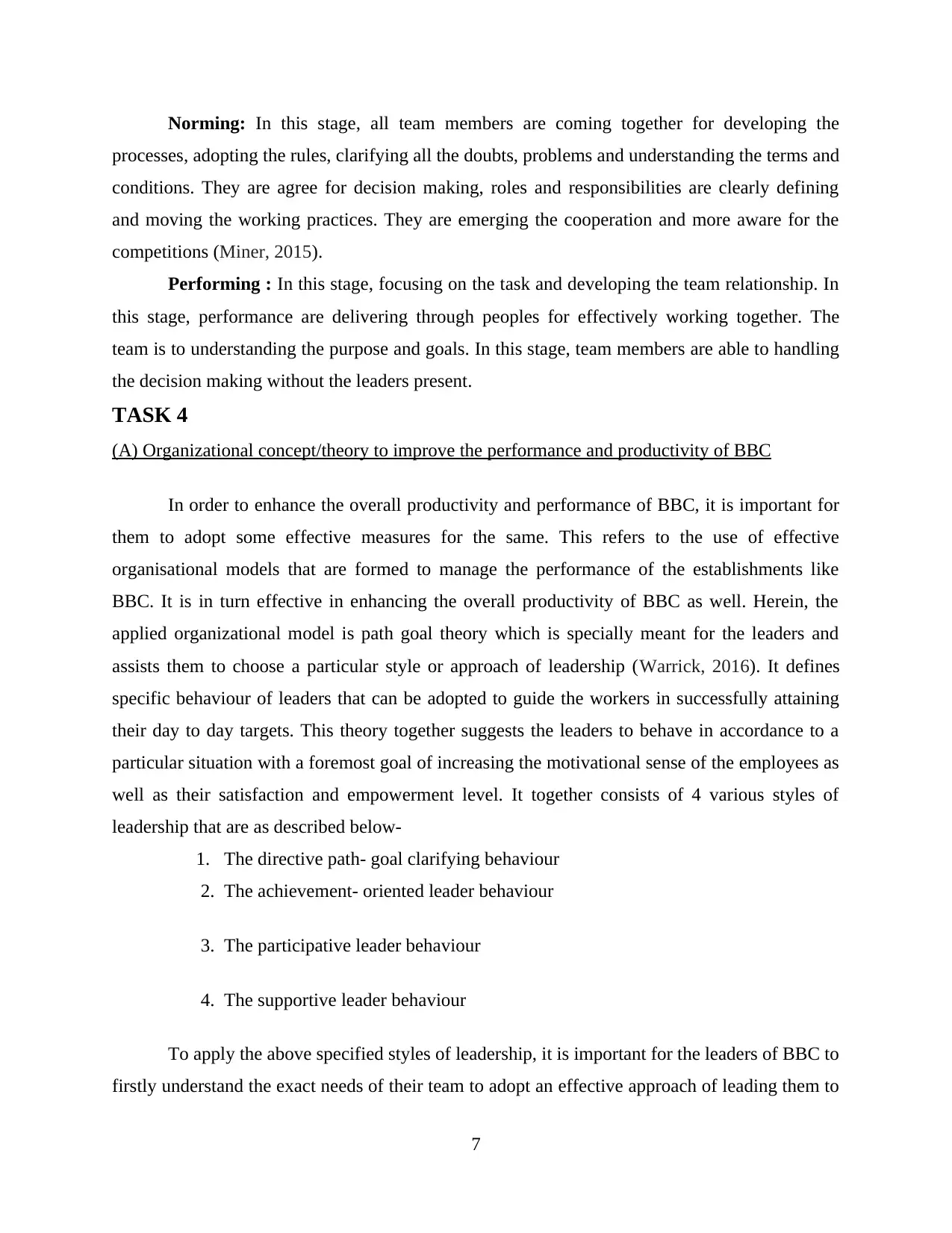
Norming: In this stage, all team members are coming together for developing the
processes, adopting the rules, clarifying all the doubts, problems and understanding the terms and
conditions. They are agree for decision making, roles and responsibilities are clearly defining
and moving the working practices. They are emerging the cooperation and more aware for the
competitions (Miner, 2015).
Performing : In this stage, focusing on the task and developing the team relationship. In
this stage, performance are delivering through peoples for effectively working together. The
team is to understanding the purpose and goals. In this stage, team members are able to handling
the decision making without the leaders present.
TASK 4
(A) Organizational concept/theory to improve the performance and productivity of BBC
In order to enhance the overall productivity and performance of BBC, it is important for
them to adopt some effective measures for the same. This refers to the use of effective
organisational models that are formed to manage the performance of the establishments like
BBC. It is in turn effective in enhancing the overall productivity of BBC as well. Herein, the
applied organizational model is path goal theory which is specially meant for the leaders and
assists them to choose a particular style or approach of leadership (Warrick, 2016). It defines
specific behaviour of leaders that can be adopted to guide the workers in successfully attaining
their day to day targets. This theory together suggests the leaders to behave in accordance to a
particular situation with a foremost goal of increasing the motivational sense of the employees as
well as their satisfaction and empowerment level. It together consists of 4 various styles of
leadership that are as described below-
1. The directive path- goal clarifying behaviour
2. The achievement- oriented leader behaviour
3. The participative leader behaviour
4. The supportive leader behaviour
To apply the above specified styles of leadership, it is important for the leaders of BBC to
firstly understand the exact needs of their team to adopt an effective approach of leading them to
7
processes, adopting the rules, clarifying all the doubts, problems and understanding the terms and
conditions. They are agree for decision making, roles and responsibilities are clearly defining
and moving the working practices. They are emerging the cooperation and more aware for the
competitions (Miner, 2015).
Performing : In this stage, focusing on the task and developing the team relationship. In
this stage, performance are delivering through peoples for effectively working together. The
team is to understanding the purpose and goals. In this stage, team members are able to handling
the decision making without the leaders present.
TASK 4
(A) Organizational concept/theory to improve the performance and productivity of BBC
In order to enhance the overall productivity and performance of BBC, it is important for
them to adopt some effective measures for the same. This refers to the use of effective
organisational models that are formed to manage the performance of the establishments like
BBC. It is in turn effective in enhancing the overall productivity of BBC as well. Herein, the
applied organizational model is path goal theory which is specially meant for the leaders and
assists them to choose a particular style or approach of leadership (Warrick, 2016). It defines
specific behaviour of leaders that can be adopted to guide the workers in successfully attaining
their day to day targets. This theory together suggests the leaders to behave in accordance to a
particular situation with a foremost goal of increasing the motivational sense of the employees as
well as their satisfaction and empowerment level. It together consists of 4 various styles of
leadership that are as described below-
1. The directive path- goal clarifying behaviour
2. The achievement- oriented leader behaviour
3. The participative leader behaviour
4. The supportive leader behaviour
To apply the above specified styles of leadership, it is important for the leaders of BBC to
firstly understand the exact needs of their team to adopt an effective approach of leading them to
7
⊘ This is a preview!⊘
Do you want full access?
Subscribe today to unlock all pages.

Trusted by 1+ million students worldwide
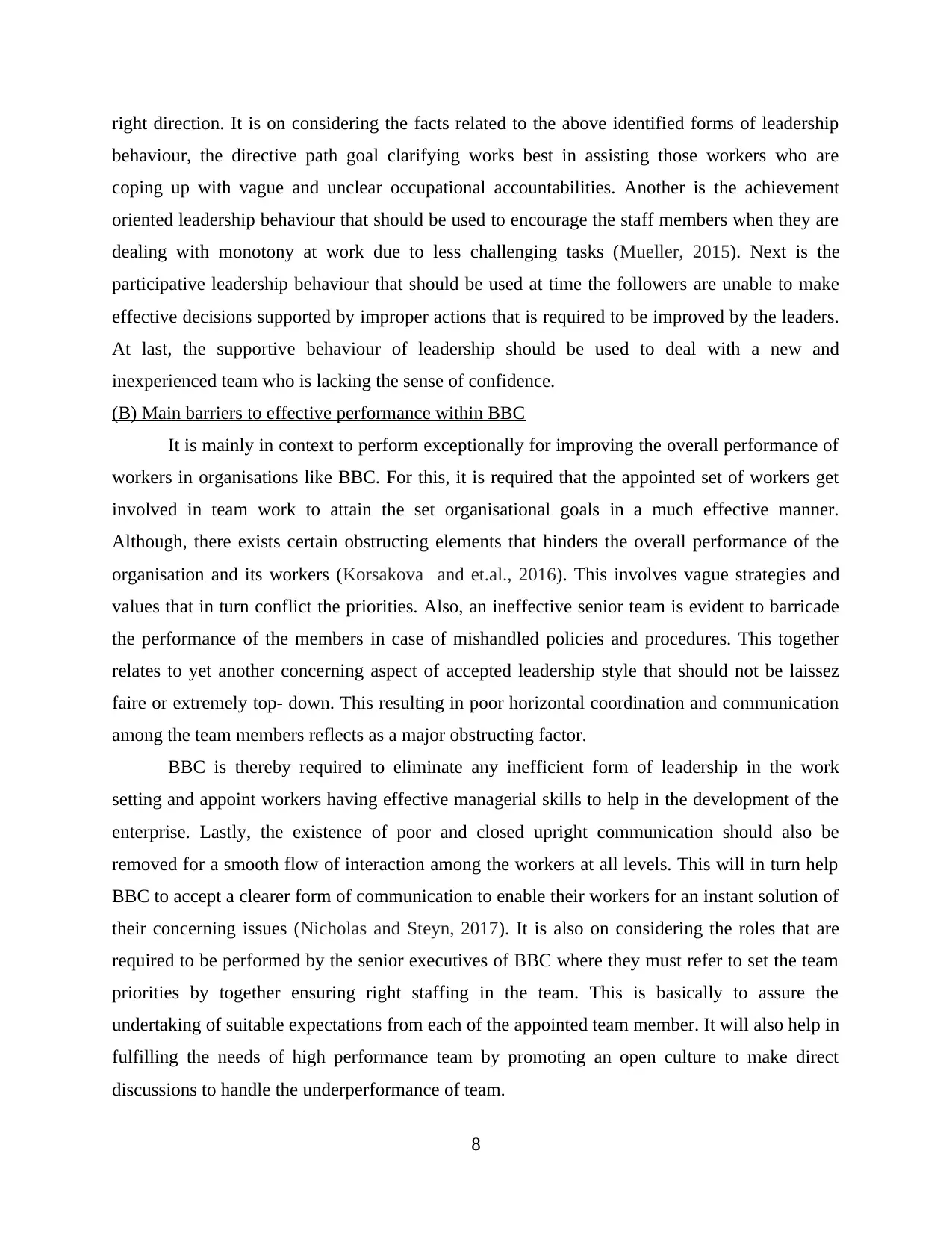
right direction. It is on considering the facts related to the above identified forms of leadership
behaviour, the directive path goal clarifying works best in assisting those workers who are
coping up with vague and unclear occupational accountabilities. Another is the achievement
oriented leadership behaviour that should be used to encourage the staff members when they are
dealing with monotony at work due to less challenging tasks (Mueller, 2015). Next is the
participative leadership behaviour that should be used at time the followers are unable to make
effective decisions supported by improper actions that is required to be improved by the leaders.
At last, the supportive behaviour of leadership should be used to deal with a new and
inexperienced team who is lacking the sense of confidence.
(B) Main barriers to effective performance within BBC
It is mainly in context to perform exceptionally for improving the overall performance of
workers in organisations like BBC. For this, it is required that the appointed set of workers get
involved in team work to attain the set organisational goals in a much effective manner.
Although, there exists certain obstructing elements that hinders the overall performance of the
organisation and its workers (Korsakova and et.al., 2016). This involves vague strategies and
values that in turn conflict the priorities. Also, an ineffective senior team is evident to barricade
the performance of the members in case of mishandled policies and procedures. This together
relates to yet another concerning aspect of accepted leadership style that should not be laissez
faire or extremely top- down. This resulting in poor horizontal coordination and communication
among the team members reflects as a major obstructing factor.
BBC is thereby required to eliminate any inefficient form of leadership in the work
setting and appoint workers having effective managerial skills to help in the development of the
enterprise. Lastly, the existence of poor and closed upright communication should also be
removed for a smooth flow of interaction among the workers at all levels. This will in turn help
BBC to accept a clearer form of communication to enable their workers for an instant solution of
their concerning issues (Nicholas and Steyn, 2017). It is also on considering the roles that are
required to be performed by the senior executives of BBC where they must refer to set the team
priorities by together ensuring right staffing in the team. This is basically to assure the
undertaking of suitable expectations from each of the appointed team member. It will also help in
fulfilling the needs of high performance team by promoting an open culture to make direct
discussions to handle the underperformance of team.
8
behaviour, the directive path goal clarifying works best in assisting those workers who are
coping up with vague and unclear occupational accountabilities. Another is the achievement
oriented leadership behaviour that should be used to encourage the staff members when they are
dealing with monotony at work due to less challenging tasks (Mueller, 2015). Next is the
participative leadership behaviour that should be used at time the followers are unable to make
effective decisions supported by improper actions that is required to be improved by the leaders.
At last, the supportive behaviour of leadership should be used to deal with a new and
inexperienced team who is lacking the sense of confidence.
(B) Main barriers to effective performance within BBC
It is mainly in context to perform exceptionally for improving the overall performance of
workers in organisations like BBC. For this, it is required that the appointed set of workers get
involved in team work to attain the set organisational goals in a much effective manner.
Although, there exists certain obstructing elements that hinders the overall performance of the
organisation and its workers (Korsakova and et.al., 2016). This involves vague strategies and
values that in turn conflict the priorities. Also, an ineffective senior team is evident to barricade
the performance of the members in case of mishandled policies and procedures. This together
relates to yet another concerning aspect of accepted leadership style that should not be laissez
faire or extremely top- down. This resulting in poor horizontal coordination and communication
among the team members reflects as a major obstructing factor.
BBC is thereby required to eliminate any inefficient form of leadership in the work
setting and appoint workers having effective managerial skills to help in the development of the
enterprise. Lastly, the existence of poor and closed upright communication should also be
removed for a smooth flow of interaction among the workers at all levels. This will in turn help
BBC to accept a clearer form of communication to enable their workers for an instant solution of
their concerning issues (Nicholas and Steyn, 2017). It is also on considering the roles that are
required to be performed by the senior executives of BBC where they must refer to set the team
priorities by together ensuring right staffing in the team. This is basically to assure the
undertaking of suitable expectations from each of the appointed team member. It will also help in
fulfilling the needs of high performance team by promoting an open culture to make direct
discussions to handle the underperformance of team.
8
Paraphrase This Document
Need a fresh take? Get an instant paraphrase of this document with our AI Paraphraser
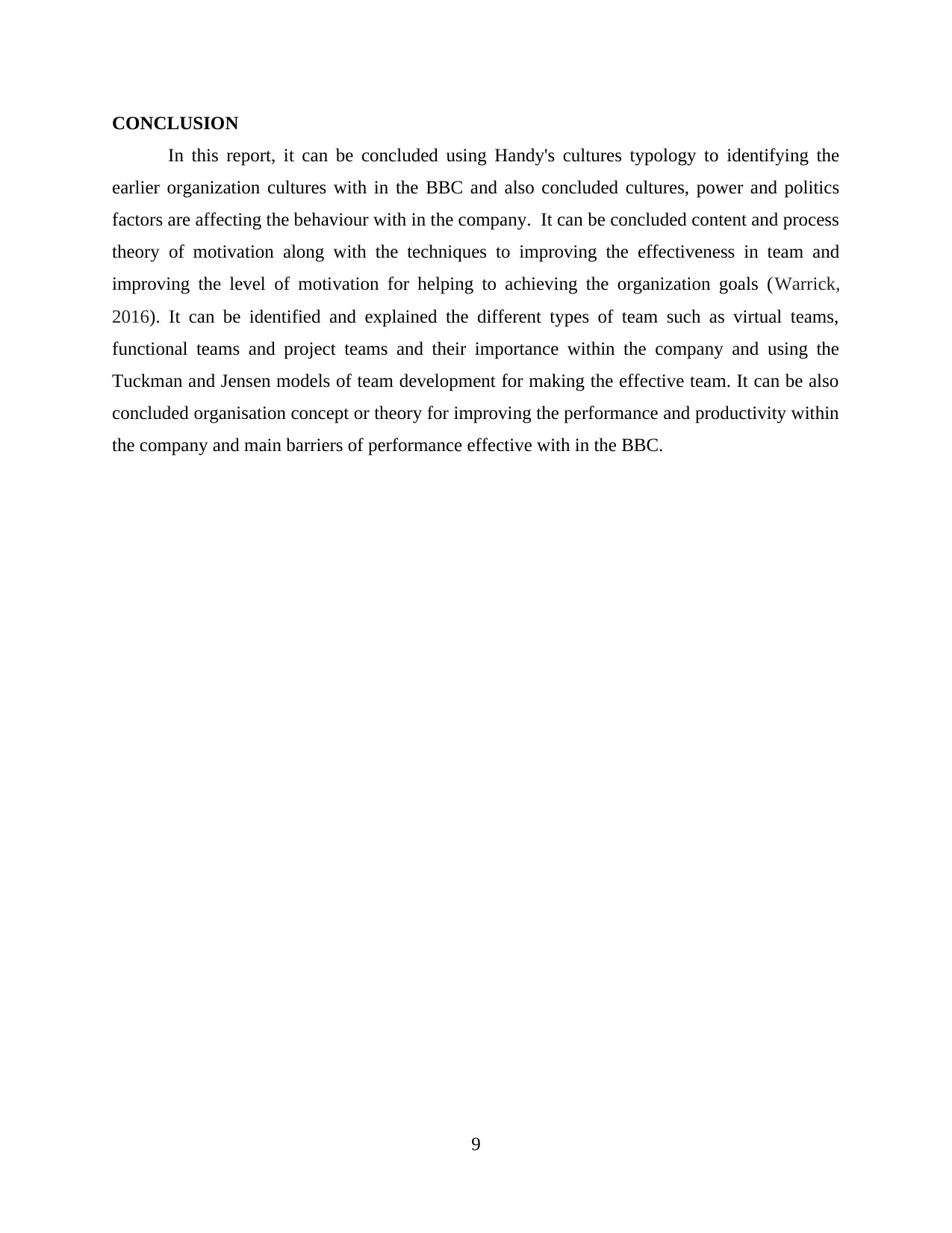
CONCLUSION
In this report, it can be concluded using Handy's cultures typology to identifying the
earlier organization cultures with in the BBC and also concluded cultures, power and politics
factors are affecting the behaviour with in the company. It can be concluded content and process
theory of motivation along with the techniques to improving the effectiveness in team and
improving the level of motivation for helping to achieving the organization goals (Warrick,
2016). It can be identified and explained the different types of team such as virtual teams,
functional teams and project teams and their importance within the company and using the
Tuckman and Jensen models of team development for making the effective team. It can be also
concluded organisation concept or theory for improving the performance and productivity within
the company and main barriers of performance effective with in the BBC.
9
In this report, it can be concluded using Handy's cultures typology to identifying the
earlier organization cultures with in the BBC and also concluded cultures, power and politics
factors are affecting the behaviour with in the company. It can be concluded content and process
theory of motivation along with the techniques to improving the effectiveness in team and
improving the level of motivation for helping to achieving the organization goals (Warrick,
2016). It can be identified and explained the different types of team such as virtual teams,
functional teams and project teams and their importance within the company and using the
Tuckman and Jensen models of team development for making the effective team. It can be also
concluded organisation concept or theory for improving the performance and productivity within
the company and main barriers of performance effective with in the BBC.
9
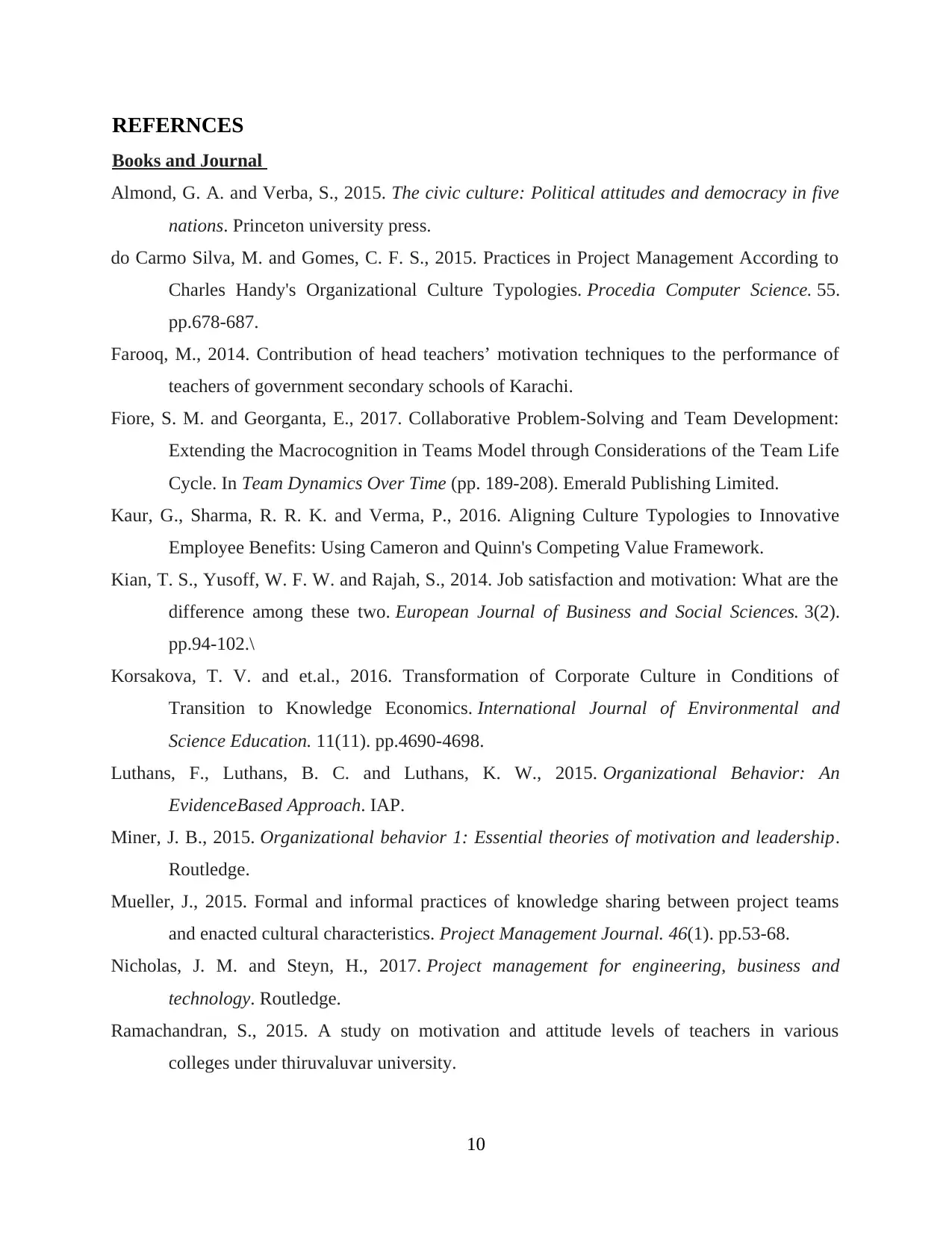
REFERNCES
Books and Journal
Almond, G. A. and Verba, S., 2015. The civic culture: Political attitudes and democracy in five
nations. Princeton university press.
do Carmo Silva, M. and Gomes, C. F. S., 2015. Practices in Project Management According to
Charles Handy's Organizational Culture Typologies. Procedia Computer Science. 55.
pp.678-687.
Farooq, M., 2014. Contribution of head teachers’ motivation techniques to the performance of
teachers of government secondary schools of Karachi.
Fiore, S. M. and Georganta, E., 2017. Collaborative Problem-Solving and Team Development:
Extending the Macrocognition in Teams Model through Considerations of the Team Life
Cycle. In Team Dynamics Over Time (pp. 189-208). Emerald Publishing Limited.
Kaur, G., Sharma, R. R. K. and Verma, P., 2016. Aligning Culture Typologies to Innovative
Employee Benefits: Using Cameron and Quinn's Competing Value Framework.
Kian, T. S., Yusoff, W. F. W. and Rajah, S., 2014. Job satisfaction and motivation: What are the
difference among these two. European Journal of Business and Social Sciences. 3(2).
pp.94-102.\
Korsakova, T. V. and et.al., 2016. Transformation of Corporate Culture in Conditions of
Transition to Knowledge Economics. International Journal of Environmental and
Science Education. 11(11). pp.4690-4698.
Luthans, F., Luthans, B. C. and Luthans, K. W., 2015. Organizational Behavior: An
EvidenceBased Approach. IAP.
Miner, J. B., 2015. Organizational behavior 1: Essential theories of motivation and leadership.
Routledge.
Mueller, J., 2015. Formal and informal practices of knowledge sharing between project teams
and enacted cultural characteristics. Project Management Journal. 46(1). pp.53-68.
Nicholas, J. M. and Steyn, H., 2017. Project management for engineering, business and
technology. Routledge.
Ramachandran, S., 2015. A study on motivation and attitude levels of teachers in various
colleges under thiruvaluvar university.
10
Books and Journal
Almond, G. A. and Verba, S., 2015. The civic culture: Political attitudes and democracy in five
nations. Princeton university press.
do Carmo Silva, M. and Gomes, C. F. S., 2015. Practices in Project Management According to
Charles Handy's Organizational Culture Typologies. Procedia Computer Science. 55.
pp.678-687.
Farooq, M., 2014. Contribution of head teachers’ motivation techniques to the performance of
teachers of government secondary schools of Karachi.
Fiore, S. M. and Georganta, E., 2017. Collaborative Problem-Solving and Team Development:
Extending the Macrocognition in Teams Model through Considerations of the Team Life
Cycle. In Team Dynamics Over Time (pp. 189-208). Emerald Publishing Limited.
Kaur, G., Sharma, R. R. K. and Verma, P., 2016. Aligning Culture Typologies to Innovative
Employee Benefits: Using Cameron and Quinn's Competing Value Framework.
Kian, T. S., Yusoff, W. F. W. and Rajah, S., 2014. Job satisfaction and motivation: What are the
difference among these two. European Journal of Business and Social Sciences. 3(2).
pp.94-102.\
Korsakova, T. V. and et.al., 2016. Transformation of Corporate Culture in Conditions of
Transition to Knowledge Economics. International Journal of Environmental and
Science Education. 11(11). pp.4690-4698.
Luthans, F., Luthans, B. C. and Luthans, K. W., 2015. Organizational Behavior: An
EvidenceBased Approach. IAP.
Miner, J. B., 2015. Organizational behavior 1: Essential theories of motivation and leadership.
Routledge.
Mueller, J., 2015. Formal and informal practices of knowledge sharing between project teams
and enacted cultural characteristics. Project Management Journal. 46(1). pp.53-68.
Nicholas, J. M. and Steyn, H., 2017. Project management for engineering, business and
technology. Routledge.
Ramachandran, S., 2015. A study on motivation and attitude levels of teachers in various
colleges under thiruvaluvar university.
10
⊘ This is a preview!⊘
Do you want full access?
Subscribe today to unlock all pages.

Trusted by 1+ million students worldwide
1 out of 13
Related Documents
Your All-in-One AI-Powered Toolkit for Academic Success.
+13062052269
info@desklib.com
Available 24*7 on WhatsApp / Email
![[object Object]](/_next/static/media/star-bottom.7253800d.svg)
Unlock your academic potential
Copyright © 2020–2026 A2Z Services. All Rights Reserved. Developed and managed by ZUCOL.





